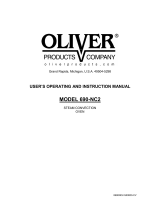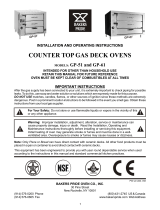
Operation
17
MenuSelectt Control
OPERATION
Oven Startup
1. Be sure the GAS SHUTOFF SWITCH (17) and
CIRCUIT BREAKER (16) are in the on position.
The display flashes OFF PRESS POWER KEY
TO START.
NOTE: If the real time clock and auto wake up
functions are enabled the display
reads PRESS POWER KEY TO START
AUTO START.
2. Press the POWER KEY (15). The display reads
PREHEAT and the oven heats to the last manuĆ
al set temperature. The display flashes READY
/ IDLE and the alarm beeps 5 times when the
oven is at temperature and ready to bake.
Manual Baking Mode
1. Turn the DIAL (5) until the display reads
MANUAL.
2. Press the TIME KEY (7). Rotate the dial, or use
the alpha/numeric keypad to enter the desired
bake time. Press the center of the dial to set
the bake time.
3. Press the TEMP KEY (6). Rotate the dial, or
use the alpha/numeric keypad to enter the deĆ
sired bake temperature. Press the center of
the dial to set the bake temperature. The oven
preheats to the new temperature.
4. To inject steam at the beginning of the bake
cycle, press the STEAM KEY (8). Rotate the
dial, or use the alpha/numeric keypad to enter
up to two minutes of steam. Press the center
of the dial to set the steam time.
NOTE: The convection fan will not run during
a steam cycle. It is not necessary to set
a fan delay while steaming.
5. For additional fan delay time, press the FAN
DELAY KEY (9). Rotate the dial, or use the alĆ
pha/numeric keypad to enter up to 1 hour and
39 minutes. Press the center of the dial to set
the fan delay.
6. When the display flashes READY / IDLE, open
the doors. The rack rotates to the load/unload
position. Load the product.
7. Press the START/STOP KEY (1) to begin the
bake cycle. The timer counts down and the
display alternates between the set and actual
temperature and the name of the product.
Programmed Baking Mode
1. Turn the DIAL (5) until the name of the product
is highlighted. Press the center of the dial to
select. The oven preheats to the programmed
temperature. The display flashes READY / IDLE
and the alarm beeps 5 times when the oven is
at temperature and ready to bake.
2. Open the doors. The rack rotates to the load/unĆ
load position. Load the product.
3. Press the START/STOP KEY (1) to begin the
bake cycle. The timer counts down and the
display alternates between the set and actual
temperature and the name of the product.
During Any Bake Cycle
1. To inject up to two minutes of steam during the
bake cycle, press the QUICK STEAM KEY (11).
2. To vent moisture from the oven cavity, press
the VENT KEY (10). This manually opens the
vent until the key is pressed again to close it.
3. To pause a bake cycle at any point, press the
START/STOP KEY (1). The LED on the start/
stop key flashes. The bake cycle will pause
until the key is pressed again.
4. To cancel the bake cycle, press and hold the
START/STOP KEY (1).





















